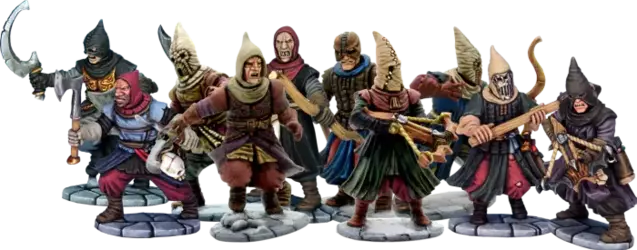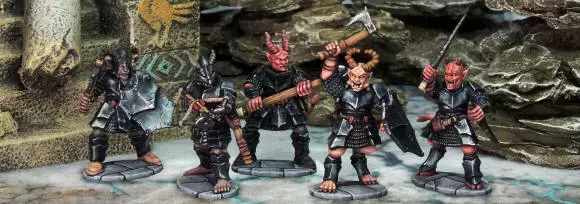I liked them enough to see if there were other monster units i could buy, or anything about the system they were meant to used for, and could find absolutely fucking zilch - nothing about armies, units, rules.
Can help here.
Gloomhaven I know least about, other than it's DnD-lite dungeon crawl board game with a deck management element and legacy mechanics. Frostgrave is a skirmish war game with NPC monsters running around. It has various spin offs.
I'm not sure why people sing the praises of Reaper and Wizkids when Northstar and Wargames Atlantic exist, but that's just me. One of the few perks of being British I think.
Anyway, the monsters they do. I can highly recommend their cultist set if you liked the Gnolls set.

They do demons,

cultists 2*, along with various humans in 1 and 2*. Oathmark has the usual dwarves, elves, orcs, and undead. Ghost Archipelago has tribals and snakemen. The snakemen look weird tho. There is a cultists 3 coming out at some point.
Many of their sets have 2. These are usually female variants, so cultists 2 is female cultists, soldiers 2 is female soldiers, etc.
Another thing people do is kitbash them with their sci-fi minis. Usually putting sci-fi bits on the fantasy stuff to use them as chaos stuff, but you could go the other way.
Wargames Atlantic has giant spiders, lizard men, giant alien bugs. ogres, werewolves, and generic villagers and guards. Usually you need to provide your own bases if you go WGA.
From there there's various historicals. Fireforge put out some 28mm samurai that got rave reviews, and crusaders literally called the Deus Vult range.
No good source of aberrations yet.
never was a big fan of the dnd games, for one I can simply play the real thing, and imo too expensive to what they offer.
I didn't like how most of the game took place at tile edges.
In general, games like Descent offer DnD in a board game package, which isn't nothing. It's easier to sell people on a board game than a RPG, and there's no expectation to act in character. and the more constrained rules mean they don't have to wrap their head around the "rulings" part of DnD.
A great example of this dichotomy is the Arkham games. There's me, who reads the flavour text. And those that go "erm... blahblahblah... roll muscles."

